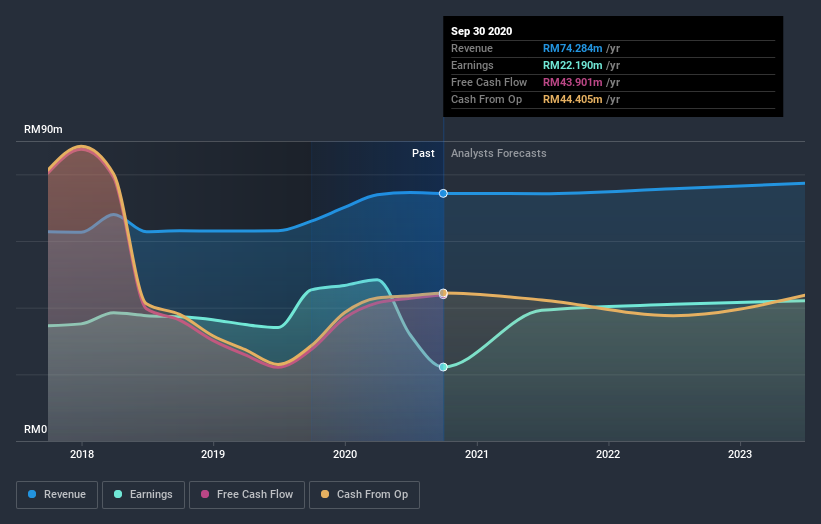- Malaysia
- /
- Retail REITs
- /
- KLSE:KIPREIT
Do Institutions Own KIP Real Estate Investment Trust (KLSE:KIPREIT) Shares?

If you want to know who really controls KIP Real Estate Investment Trust (KLSE:KIPREIT), then you'll have to look at the makeup of its share registry. Insiders often own a large chunk of younger, smaller, companies while huge companies tend to have institutions as shareholders. I quite like to see at least a little bit of insider ownership. As Charlie Munger said 'Show me the incentive and I will show you the outcome.
KIP Real Estate Investment Trust is a smaller company with a market capitalization of RM412m, so it may still be flying under the radar of many institutional investors. Our analysis of the ownership of the company, below, shows that institutions are noticeable on the share registry. Let's take a closer look to see what the different types of shareholders can tell us about KIP Real Estate Investment Trust.
See our latest analysis for KIP Real Estate Investment Trust

What Does The Institutional Ownership Tell Us About KIP Real Estate Investment Trust?
Institutional investors commonly compare their own returns to the returns of a commonly followed index. So they generally do consider buying larger companies that are included in the relevant benchmark index.
As you can see, institutional investors have a fair amount of stake in KIP Real Estate Investment Trust. This implies the analysts working for those institutions have looked at the stock and they like it. But just like anyone else, they could be wrong. If multiple institutions change their view on a stock at the same time, you could see the share price drop fast. It's therefore worth looking at KIP Real Estate Investment Trust's earnings history below. Of course, the future is what really matters.

KIP Real Estate Investment Trust is not owned by hedge funds. From our data, we infer that the largest shareholder is Lak Chew (who also holds the title of Senior Key Executive) with 20% of shares outstanding. Its usually considered a good sign when insiders own a significant number of shares in the company, and in this case, we're glad to see a company insider play the role of a key stakeholder. For context, the second largest shareholder holds about 19% of the shares outstanding, followed by an ownership of 4.9% by the third-largest shareholder. Interestingly, the second-largest shareholder, Kook Ong is also Senior Key Executive, again, pointing towards strong insider ownership amongst the company's top shareholders.
Our research also brought to light the fact that roughly 50% of the company is controlled by the top 5 shareholders suggesting that these owners wield significant influence on the business.
While studying institutional ownership for a company can add value to your research, it is also a good practice to research analyst recommendations to get a deeper understand of a stock's expected performance. While there is some analyst coverage, the company is probably not widely covered. So it could gain more attention, down the track.
Insider Ownership Of KIP Real Estate Investment Trust
The definition of an insider can differ slightly between different countries, but members of the board of directors always count. Management ultimately answers to the board. However, it is not uncommon for managers to be executive board members, especially if they are a founder or the CEO.
Most consider insider ownership a positive because it can indicate the board is well aligned with other shareholders. However, on some occasions too much power is concentrated within this group.
Our information suggests that insiders maintain a significant holding in KIP Real Estate Investment Trust. Insiders own RM173m worth of shares in the RM412m company. I would say this shows alignment with shareholders, but it is worth noting that the company is still quite small; some insiders may have founded the business. You can click here to see if those insiders have been buying or selling.
General Public Ownership
With a 27% ownership, the general public have some degree of sway over KIP Real Estate Investment Trust. While this size of ownership may not be enough to sway a policy decision in their favour, they can still make a collective impact on company policies.
Private Company Ownership
We can see that Private Companies own 6.1%, of the shares on issue. It might be worth looking deeper into this. If related parties, such as insiders, have an interest in one of these private companies, that should be disclosed in the annual report. Private companies may also have a strategic interest in the company.
Next Steps:
It's always worth thinking about the different groups who own shares in a company. But to understand KIP Real Estate Investment Trust better, we need to consider many other factors. Be aware that KIP Real Estate Investment Trust is showing 4 warning signs in our investment analysis , and 1 of those is potentially serious...
Ultimately the future is most important. You can access this free report on analyst forecasts for the company.
NB: Figures in this article are calculated using data from the last twelve months, which refer to the 12-month period ending on the last date of the month the financial statement is dated. This may not be consistent with full year annual report figures.
When trading KIP Real Estate Investment Trust or any other investment, use the platform considered by many to be the Professional's Gateway to the Worlds Market, Interactive Brokers. You get the lowest-cost* trading on stocks, options, futures, forex, bonds and funds worldwide from a single integrated account. Promoted
Valuation is complex, but we're here to simplify it.
Discover if KIP Real Estate Investment Trust might be undervalued or overvalued with our detailed analysis, featuring fair value estimates, potential risks, dividends, insider trades, and its financial condition.
Access Free AnalysisThis article by Simply Wall St is general in nature. It does not constitute a recommendation to buy or sell any stock, and does not take account of your objectives, or your financial situation. We aim to bring you long-term focused analysis driven by fundamental data. Note that our analysis may not factor in the latest price-sensitive company announcements or qualitative material. Simply Wall St has no position in any stocks mentioned.
*Interactive Brokers Rated Lowest Cost Broker by StockBrokers.com Annual Online Review 2020
Have feedback on this article? Concerned about the content? Get in touch with us directly. Alternatively, email editorial-team (at) simplywallst.com.
About KLSE:KIPREIT
KIP Real Estate Investment Trust
KIP Real Estate Investment Trust (“KIP REIT”) was listed on the Main Market of Bursa Malaysia Securities Berhad on 6 February 2017 with its principal activity being investing in a portfolio of retail real estate properties.
Good value average dividend payer.
Market Insights
Community Narratives




